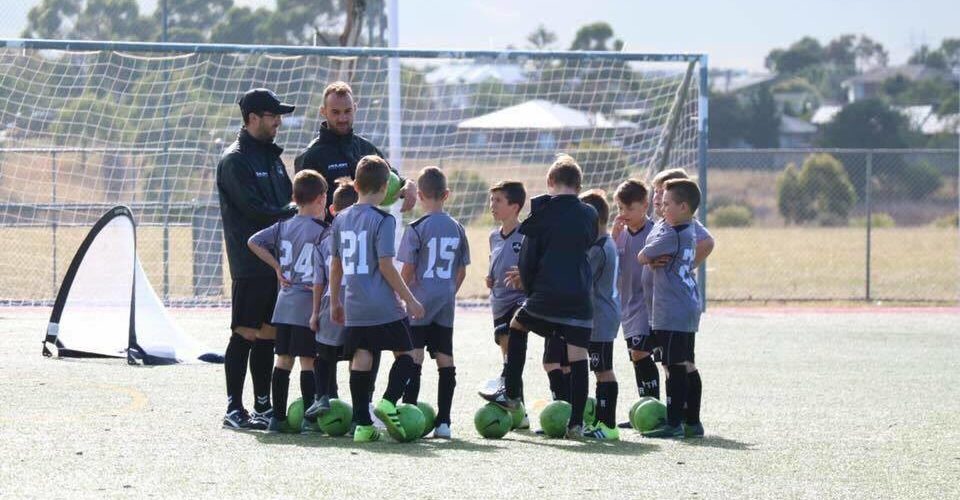Image: Football Technique Australia
By Ljuban Palinic
The concept of development vs. winning in youth football is an ongoing hot topic that is heavily debated among coaches, parents and supporters of the global game. Development and winning are both an essential part of football, but which area should we focus on when it comes to youth football, and at what age?
Are we focusing on the short-term win at the expense of long-term development? What is more important to you as a coach or a parent?
The importance of making mistakes
To be comfortable on the ball, I believe children should be encouraged to get as many touches of the ball as possible and supported when they make a mistake. Mistakes are necessary for our youth players to improve. Patience, guidance and believing in your players are essential in the development of all young players. Mistakes are a crucial part of learning and the way we respond to these errors as parents and coaches will determine the type of players we create.
Ex-youth Barcelona coach, Joan Della Morte, suggests:
“What we really must analyse is not the goal, but the path we choose to obtain it. This is where the focus must be placed, in the process, not the objective.”
His beliefs are that we need to create a solid base for players and, for this to occur, our focus should be on setting priorities, drawing a framework, creating conditions for the group of players to speak the same technical-tactical language, and set a priority in the style of play that has been chosen to achieve the goal (win). Consequently, if the players are receptive to the coach’s direction, this will result in an improvement in performance and ultimately the good result will follow.
We need to give children the football tools they will require when they are older, where the winning result is much more important, and not be scared to make a mistake. More importantly, I encourage that coaches keep track of the technical and tactical skills of the individual player and align this in relevance to age.
Age and required components of development
Essentially, football is a game that requires excellent technique, decision-making, football intelligence and physique. Each individual player develops at a different time and pace. Coaches should recognise this and help young players learn to build their skills at their own pace. More importantly, I would encourage coaches to prioritise football practices relative to the player requirements.
Arsenal FC coach Arsene Wenger once linked football player development to building a house, in the way that player development is a step-by-step process and that you can’t build the room before building the base. He believes for youth players to have any chance of reaching the highest level of football, technique is a vital component up to the age of 14. Without this, a higher standard of play will be hard to reach. He refers to technique as the base of the house that should be a large component and focus for players up to the age of 14. His representation of the first floor of a house is the developing player from 14-17 years of age where physical components are introduced. The second floor, he believes, is a representation of the tactical awareness of players: where, when and how to move and understand why you are moving there.
The last stage of the developing player representing the roof is: what level of success does the player want to reach?
What do other countries believe?
The french football system, for example, has a significant focus on technique in early ages and developing players who are fantastic with the ball (A. M, INF Football Academy).
According to INF Academy director Andre Merelle, a ‘winning at all costs’ mentality is not good for player’s football development (A.M, INF Football Academy).
When these situations and environments are created, coaches and games are based around: physical attributes, kicking the ball further up the park, and which team can score more goals rather than the importance of the player development. In these environments, children are put under too much pressure to get a result and making mistakes is not considered acceptable.
Football should be a focus of being comfortable in tight areas and encouraging pressure to improve. We want our players to be quicker in speed of thought, tactically intelligent, and excellent in first touch, passing and dribbling.
I’d encourage all coaches and parents to create environments that focus on development. The best way to analyse winning is to assess if players are playing well and not if they have conceded or scored five goals. Players are more likely to thrive and develop if coaches and parents are supportive and encouraging rather than negative. Constructive criticism is an integral part of youth development if handled carefully.
Development and performance is often misunderstood. Some coaches and parents believe that environments that focus their training and games on player development have no desire to win games. They often believe that players should be striving to win and that coaches should provide an environment where excellence in performance is the goal. While everyone loves to win, I believe it’s important for youth players and their environment to steer clear of pushing a ‘win at all costs’ mentality.
It’s possible to combine a focus and encouragement on development while striving for optimal performance and a positive winning culture. The key is to distinguish between the two and decide what is most important in youth sport, in order to create a well-rounded athletic environment. To do this, it is important to ensure the coach and the parent process does not emphasise the result over the learning opportunity.
When focusing on the result, coaches generally focus more of their sessions on tactics, long balls and clearing the back line to ensure safety instead of encouraging control, passing, dribbling and problem solving with correct decision-making.
Another example of outstanding youth development and technical players is the Spanish youth system. The Spanish youth system has a large focus on technique, short passing and quick decision-making. The domination in world football with the Spanish national team and FC Barcelona has revolutionised the game, the style of play and players to produce. Their ongoing development of quality players in top-level football is astonishing. We need to learn more from these countries and ask ourselves why they do it this way.
According to La Liga president Jose Luis Asitizaran in an interview with Telegraph, he believes the most important thing is to be patient with your youth and invest in your own home-grown players. The World Cup in 2010 was dedicated towards the youth development system and its coaches for developing such talent and sticking to the system.
Why go to 9v9 in under-12s?
Recently, the FFV implemented a nine-a-side half-pitch competition without points for our U1’s that I believe is a positive step towards youth development and improving the next generation of players.
Small-sided games are essential in developing quick problem solvers.
Small-sided games encourage more touches on the ball, develop quicker decision making, comfort in tight areas and ultimately develop smarter and more intelligent players who display initiative.
Additionally, in Catalonia, children are playing seven-a-side football until the age of 13. They have a desire to produce quality footballers and their focus is on the development and performance of the game rather than the result, and who is first on the ladder speaks for itself. I believe one of the current biggest issues we have in Victoria is children and parents are drawn to the teams that are considered to be performing the best on the ladder.
With the best intentions for a player’s long-term development, be mindful that when a team is first on the ladder in the league, this does not necessarily label them as the best youth developing team with the best intentions for you long term.
In summary, football is a game of many opinions and that is the beautiful thing about the game. In my opinion, all coaches and parents should allow players to focus on the development of skill and the long-term gain rather than putting too much emphasis on this weekend’s result.
There’s a famous saying that that describes this perfectly: ‘As you sow, so shall you reap’.
Originally published in Football Technique Australia

